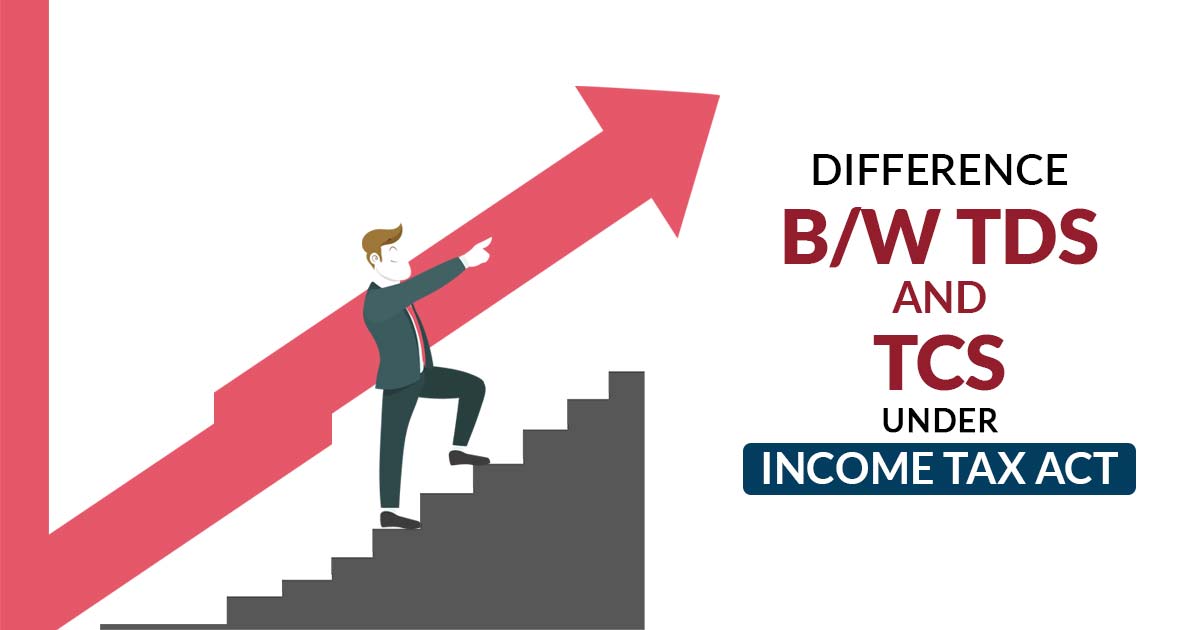
Tax deducted at Source (TDS) and Tax Collected at Source (TCS) are the most popular methods of tax collection. To guarantee correct adherence to the tax regulations, it is crucial to recognise the difference between TDS and TCS under the Income Tax Act 1961, since these are some big ones. Let’s get into it in more depth.
An Explanation About TDS
Some people or organisations are required to deduct TDS from any payments received for specific services under the Income Tax Act of 1961. Services including rent, professional fees, contract payments, commissions, and royalty payments are among them. Some investment kinds, such as interest on fixed deposits and other deposits in banks, post offices, etc., are also subject to TDS.
Depending on the kind of payment and the recipient’s income level, the TDS rate varies. People must pay varying TDS rates depending on their tax bracket. The payer is in charge of figuring out the appropriate TDS rate and subtracting it before making the payment.
The TDS deducted must subsequently be remitted to the government within a predetermined timeframe. A document from the payer to the beneficiary detailing the amount of tax deducted and deposited is also necessary. Form 16 or TDS Certificate is the name of this document.
Simple to Understand About TCS
According to the Income Tax Act, TCS is a sort of tax that is collected from the buyer at the time of a sale of goods or the supply of services.
It is applied to the sale of a few specific commodities and services, including automobiles, etc. By the rules of the Income Tax Act of 1961, the collected tax is then deposited with the Government of India.
Read Also: Very Easy to Understand Main Income Tax vs TDS Differences
All merchants who market specific products and offer specific services are subject to TCS. When the transaction involves more than Rs. 2 lakhs, TCS is applicable. The TCS rate varies based on the kind of goods or services, from 0.1% to 10%.
Major Differences Between TDS and TCS in Income Tax
Taxpayers in India have access to two tax systems i.e. TCS and TDS. Although these two systems differ from one another in many ways, they both give the government a tool to collect taxes from citizens and companies. For an easy understanding of the differences between TDS and TCS, we will discuss below some of its major points:
TDS & TCS Applicability: Although Tax Deducted At Source(TDS) applies to income obtained by the taxpayer, such as salary, commission, rent, etc., TCS is only applicable to specifically designated transactions such as the sale of goods or services.
Tax Liability: As opposed to TCS, where the seller is required to collect tax from the buyer at the relevant rate on the sale of certain goods and services and deposit it with the government, TDS requires the deductor to deduct tax from the source and deposit it with the government.
Taxation Rate: The TCS rate is often less than the TDS rate. For instance, TDS is levied at the identical rate as relevant income tax, but TCS is normally assessed at 0.1 per cent or 1 percent, depending on the transaction.
Tax Payment: The collected money is paid immediately to the government by the seller in the case of TCS, while the amount is deducted from the payer’s account before payment and deposited with the government in the case of TDS.
ITR Filing: Both TDS (Tax Deducted at Source) and TCS (Tax Collected at Source) must be reported in the Income Tax Return (ITR).
Tax Refund: After tax adjustment in the Income tax return balance will be refunded to the taxpayer. Taxpayers in India have access to two tax systems, i.e. TCS and TDS.
To guarantee effective adherence to tax regulations, it is crucial to comprehend the distinctions. All Indian taxpayers must, therefore, have a good comprehension of these two tax regimes.
FAQs Related to TDS and TCS
Q.1 What are the Consequences If an Individual Fails to Deposit or Collect Tax?
If an individual taxpayer does not collect taxes, he may face many financial disallowances by the tax authority. This ignorance will lead the individual to pay interest, penalties, and imprisonment. Depending on the circumstances, a sentence of 3 to 7 years in prison and a fine of up to Rs. 1,000,000 may be imposed.
Q.2 – Can I Collect TCS in Case TDS Is Already Deducted?
No, Section 206 C-1H does not allow you to collect TCS if a purchaser is liable to pay TDS. Apart from this, you need to find out if the purchaser deducts TDS while making the final payment.
Q.3 – How to Pay TDS and TCS?
For taxpayers and corporate firms, there is a common portal through which they can pay TDS and TCS online. However, to make the offline payment, Challan 281, which you can download and submit to any authorised bank, is required.
Q.4 – What Is the Given Deadline for a TDS Refund?
The TDS refund will be discredited to your bank account in 3 to 6 months. Additionally, it requires the completion of e-verification. The TDS refund or tax refund status can be checked here.
Q.5 – How to Define TDS on a Salary?
The employer deducts TDS from the salary when it is deposited in the employee’s account.









